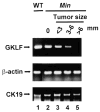Decreased expression of the gut-enriched Krüppel-like factor gene in intestinal adenomas of multiple intestinal neoplasia mice and in colonic adenomas of familial adenomatous polyposis patients
- PMID: 10913614
- PMCID: PMC2268095
- DOI: 10.1016/s0014-5793(00)01727-0
Decreased expression of the gut-enriched Krüppel-like factor gene in intestinal adenomas of multiple intestinal neoplasia mice and in colonic adenomas of familial adenomatous polyposis patients
Abstract
Gut-enriched Krüppel-like factor (GKLF) is a zinc finger-containing transcription factor, the expression of which is associated with growth arrest. We compared Gklf expression in intestinal and colonic adenomas to normal mucosa in multiple intestinal neoplasia (Min) mice and familial adenomatous polyposis (FAP) patients, respectively, using semi-quantitative RT-PCR. In Min mice, the level of Gklf transcript is highest in normal-appearing intestinal tissues and decreases as the size of the adenoma increases. In FAP patients, the level of GKLF transcript is lower in adenomas compared to paired normal-appearing mucosa from the same patient or normal colonic mucosa from control individuals without FAP. The possibility of DNA methylation as a cause for the decreased expression of Gklf in adenomas of Min mice was investigated by methylation-specific PCR. Results indicate that the Gklf gene is not methylated in either normal or tumorous tissues. The findings of our study are therefore consistent with the potential role of GKLF as a negative growth regulator of gut epithelial cells.
Figures




References
-
- Rickert RR, Auerbach O, Garfinkel MA, Hammond EC, Frasca JM. Cancer. 1979;43:1847–1857. - PubMed
-
- American Cancer Society. Cancer Facts and Figures 1999. American Cancer Society; Atlanta, GA: 1999.
-
- Fearon ER, Vogelstein B. Cell. 1990;61:759–767. - PubMed
-
- Kinzler KW, Nilbert MC, Su LK, Vogelstein B, Bryan TM, Levy DB, Smith KJ, Preisinger AC, Hedge P, McKechnie D, Finniear R, Markham A, Froffen J, Boguski MS, Altschul SF, Horaii A, Ando H, Kyoshi Y, Miki Y, Nishisho I, Nakamura Y. Science. 1991;253:661–665. - PubMed
-
- Nishisho I, Nakamura Y, Miyoshi Y, Miki Y, Ando H, Horii A, Koyama K, Utsunomiya J, Baba S, Hedge P, Markham A, Krush AJ, Perterson G, Hamilton SR, Nilber DB, Levy MC, Bryan TM, Preisinger AC, Smith KJ, Su LK, Kinzler KW, Vogelstein B. Science. 1991;253:665–669. - PubMed
Publication types
MeSH terms
Substances
Grants and funding
LinkOut - more resources
Full Text Sources
Other Literature Sources
Molecular Biology Databases
Miscellaneous

